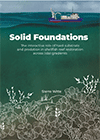PhD defence Sterre Witte
| When: | Fr 11-07-2025 at 14:30 |
| Where: | Academy Building & online |
Sterre Witte (ConsEco/MarBio)
Promotores: Prof. T. van der Heide, Prof. L.L. Govers; copromotor: Dr O. Franken

Solid foundations
The interactive role of hard substrate and predation in shellfish reef restoration across tidal gradients
Shellfish reefs, formed by mussels and oysters, have declined globally due to overfishing, pollution, and habitat loss. These species rely on existing reefs to settle and survive, so once a reef collapses, recovery becomes difficult. Reintroducing hard substrate can help restoration where (small) shellfish populations remain. This thesis explores how hard substrate availability and predation pressure, two key factors for shellfish establishment, interact across tidal zones to guide reef restoration. Field experiments showed that while bottom communities were largely similar across substrate types, native flat oysters preferentially settled on granite. Introducing hard substrates increased biodiversity and food web complexity, but did not initiate reef formation in the subtidal zone. We showed that predation is a strong limiting factor, underscoring that restoration requires more than just introducing hard substrates. Substrates with high structural complexity provided young mussels and oysters shelter from. This suggests that mimicking natural reef structures can offer reef-building shellfish the refuge needed to overcome recruitment thresholds in soft-sediment systems. Restoring shellfish reefs requires a combination of the right substrate, predation refuge, structural complexity and consideration of the tidal zone. Overall, this thesis provides a solid foundation for restoring reef-building shellfish in soft-sediment coastal ecosystems.
